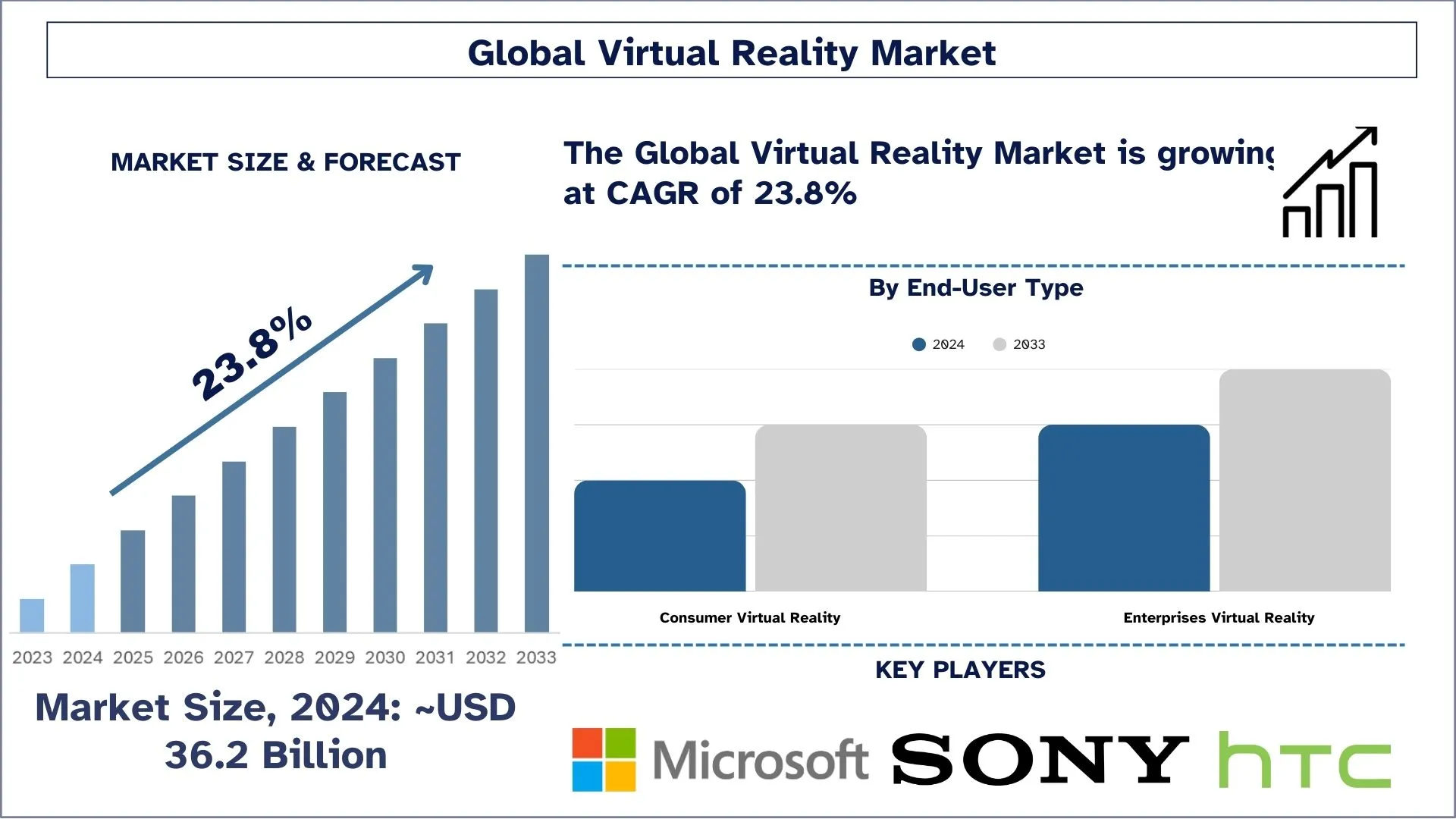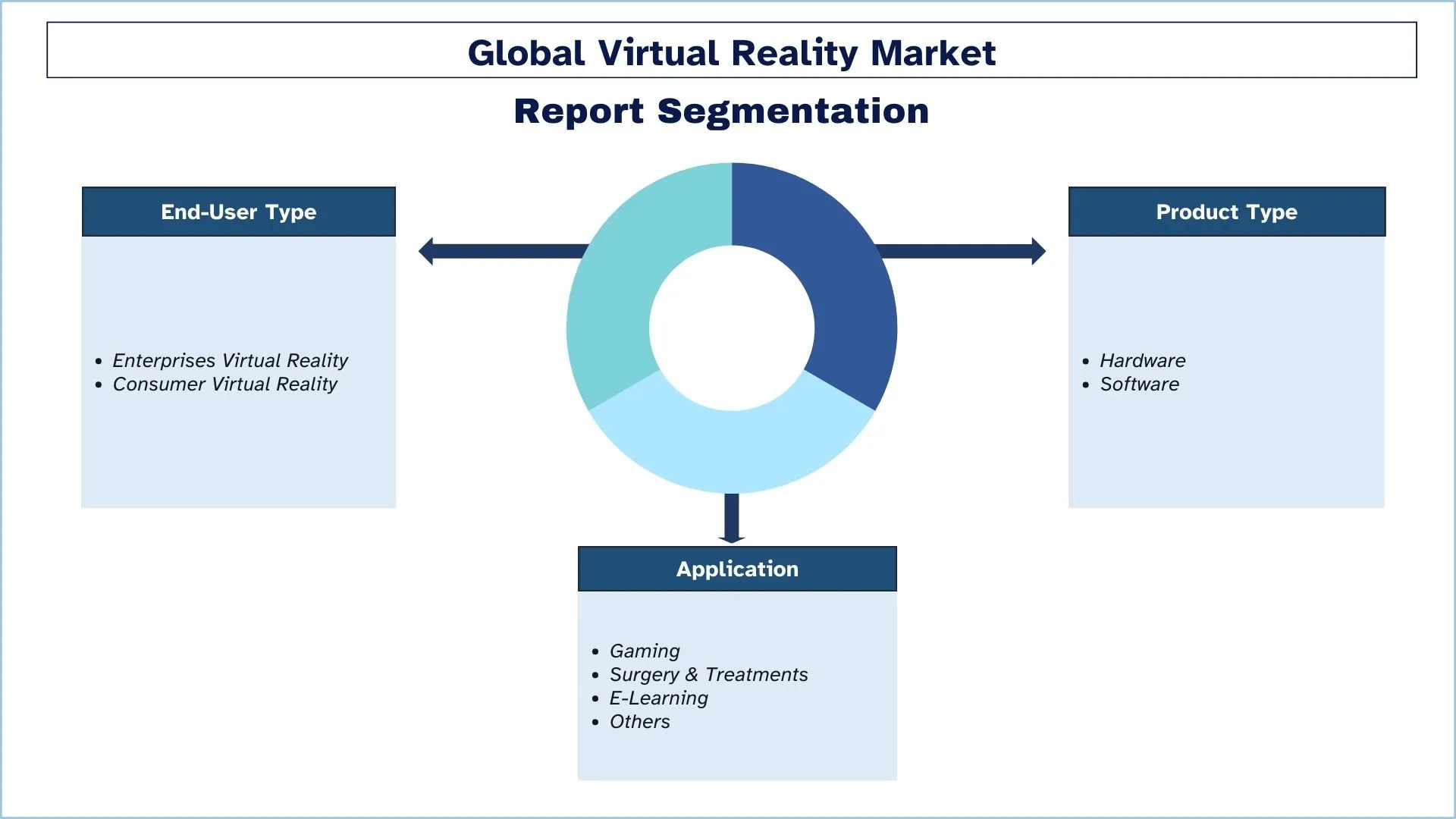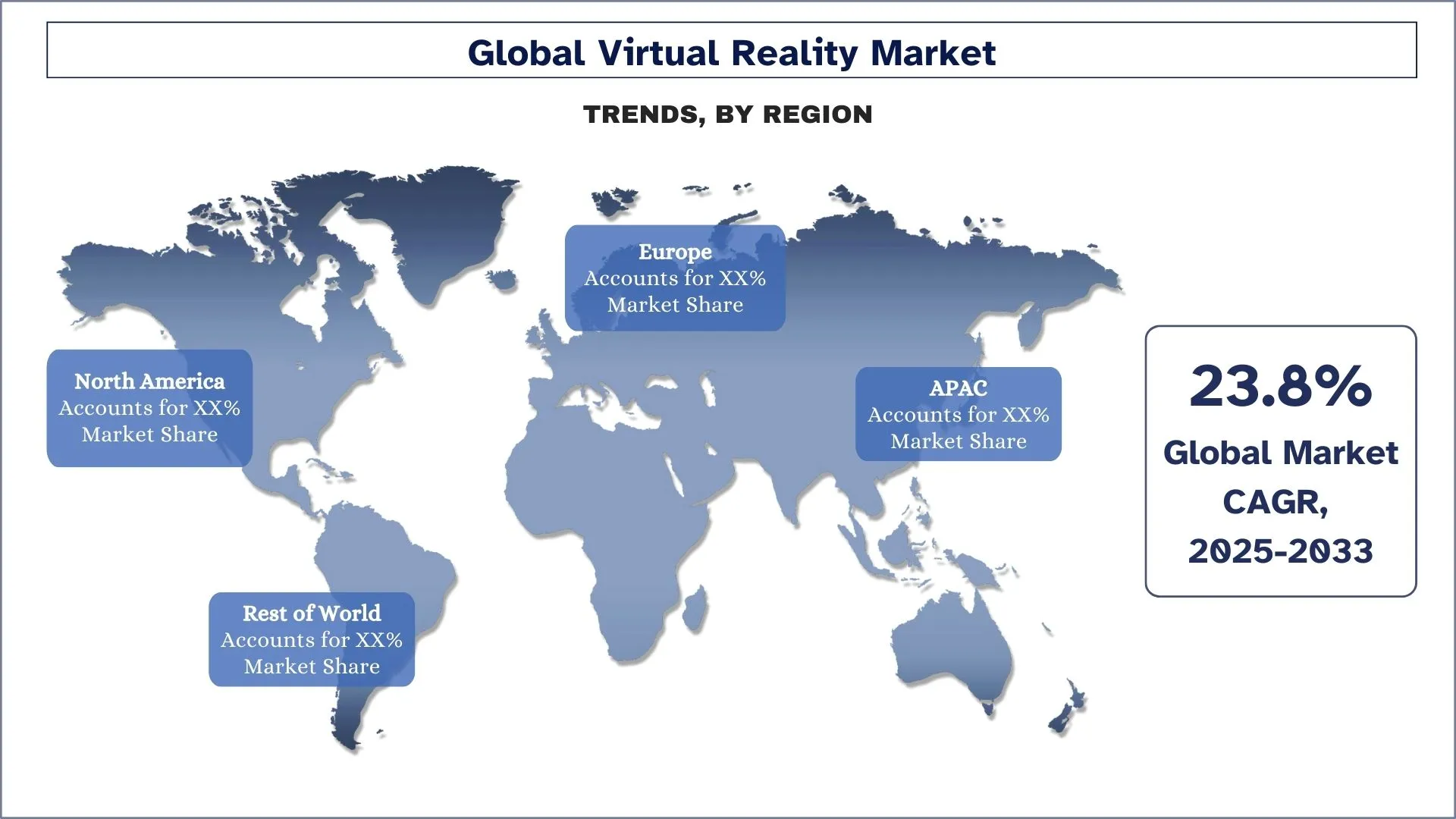- Home
- About Us
- Industry
- Services
- Reading
- Contact Us
Virtual Reality Market: Current Analysis and Forecast (2025-2033)
Emphasis on Ends User (Enterprises Virtual Reality and Consumer Virtual Reality); Product Type (Software and Hardware); Application (Gaming, Surgery & Treatments, E-Learning, and Others)); and Region/Country

Virtual Reality Market Size & Forecast
The Virtual Reality Market was valued at approximately USD 36.2 billion in 2024 and is expected to grow at a substantial CAGR of around 23.8% during the forecast period (2025-2033), owing to the growing use of VR in healthcare, education, retail, and training.
Virtual Reality Market Analysis
The market for Virtual reality has experienced a surge in popularity as an alternative investment and speculative asset class. Investors have acknowledged the potential for significant returns, particularly due to the rise in card values in recent years. As a result, there has been a substantial influx of financial capital onto the market, leading to unprecedented price levels. A notable example of this trend is the recent sale of a rare Pokémon card. In January 2021, an ungraded 1999 Pokémon First Edition Base Set Charizard card was sold for an astonishing $350,100 in an online auction. This sale not only highlighted the interest of speculators in Virtual Reality but also demonstrated the increasing acceptance of these collectibles as a viable investment option. Moreover, the COVID-19 pandemic and the resulting economic uncertainties have sparked a renewed interest in alternative investments such as Virtual Reality. With traditional investment markets experiencing volatility, individuals seeking diversification and the potential for high returns have turned their attention to the Virtual reality market.
Virtual Reality Market Trends
This section discusses the key market trends influencing the various segments of the Virtual Reality market as identified by our research experts.
Advancing Immersive Experiences
One of the biggest trends in the global VR market is better and smarter experiences with the help of AI and improving equipment, as well as increasing usage of VR technology in such fields as games, healthcare, and education. The companies are now aiming at improving the response time, improving the look, and introducing more content into VR, which makes the once entertainment-related medium of Virtual Reality get extended into more serious uses.
Virtual Reality Market Industry Segmentation
This section provides an analysis of the key trends in each segment of the global Virtual Reality market report, along with forecasts at the global, regional, and country levels for 2025-2033.
The Sports Segment is Expected to Witness a Higher CAGR than the Virtual Reality Market.
Based on card type, the market is bifurcated into sports and non-sports. The sport segment dominated the market and is expected to behave in the same fashion in the forecast period. The popularity of sports, such as baseball, basketball, football, soccer, and hockey, has contributed to the demand for Virtual reality featuring athletes from these sports. Moreover, technological advancements in the field of sports Virtual reality have played a role in the growth of the market. Moreover, digital Virtual realities are becoming increasingly popular, and this trend is expected to continue in the forecast period.
The Teenager Segment Holds the Largest Share of the Market.
Based on end user, the market is bifurcated into teenager and adult. Among them, teenagers hold a significant share of the market in 2024. Virtual Reality games, such as Pokémon and Magic: The Gathering, have gained immense popularity among teenagers, which involve collecting and trading, and providing a social and competitive aspect for teenagers. Additionally, Virtual reality provides teenagers with an opportunity to connect with other collectors and engage in social activities, such as card shows and conventions.

APAC has a significant share of the market in 2024.
APAC is expected to hold a significant share of the global virtual reality market. This is mainly attributed to rising demand from gaming, entertainment, media, aerospace and defense, retail, and manufacturing industries. Businesses in this region have invested in AR and VR in addition to simulation. In addition, virtual reality is very useful in activities such as gaming, nature exploration, hiking, and other outdoor exploration. Thus, growing VR users in the region, particularly China, will favor the proliferation of the VR market in the Asian markets. Also, the increasing adoption of VR products. Moreover, it is expected that the market will continue to grow at a steady rate during the forecast period, owing to the high-income levels of the consumers in the region, coupled with growing awareness of the significance of technology for a balanced and healthy existence.
China Dominates the APAC Virtual Reality Market
The China VR market is growing fast due to government support, expanding tech investments, and steadily rising consumer demand. This country is preparing its wildlife for the implementation of immersive technologies for gaming, education, retail, industrial training, and other sectors. Major indigenous players and new entrants are continuously investing in ecosystem development, which makes China one of the most vibrant VR markets globally.

Virtual Reality Market Industry Competitive Landscape
The virtual reality market is competitive, with several global and international players. The key players are adopting different growth strategies to enhance their market presence, such as partnerships, agreements, collaborations, new product launches, geographical expansions, and mergers and acquisitions.
Top Virtual Reality Market Companies
Some of the major players operating in the market are Samsung Electronics Co. Ltd., Sony Corporation, Microsoft Corp, Qualcomm Incorporated, Vuzix Corporation, HTC Corporation, Eon Reality Inc, NVIDIA Corp, Alphabet Inc, Meta Platforms Inc.
Recent Developments in the Virtual Reality Market
In December 2023, DPVR collaborated with SchooVR, provider of immersive educational content. The collaboration between DPVR and SchooVR aims to enhance learning solutions for teachers and students by integrating virtual reality (VR) into the classroom environment.
In October 2023, Sony unveiled the PlayStation 5 Slim version. It's a redesigned version of the original PS5 that's smaller and lighter, with a few other improvements. The PS5 Slim is about 30% smaller in volume than the original PS5. It's also lighter, making it easier to transport and fit into entertainment centers.
Virtual Reality Market Report Coverage
Report Attribute | Details |
Base year | 2024 |
Forecast period | 2025-2033 |
Growth momentum | Accelerate at a CAGR of 23.8% |
Market size 2024 | USD 36.2 Billion |
Regional analysis | APAC, Europe, Asia-Pacific, Rest of the World |
Major contributing region | Asia Pacific is expected to grow at the highest CAGR during the forecasted period. |
Key countries covered | U.S., Canada, Germany, France, UK, Spain, Italy, China, Japan, and India |
Samsung Electronics Co. Ltd., Sony Corporation, Microsoft Corp, Qualcomm Incorporated, Vuzix Corporation, HTC Corporation, Eon Reality Inc, NVIDIA Corp, Alphabet Inc, Meta Platforms Inc. | |
Report Scope | Market Trends, Drivers, and Restraints; Revenue Estimation and Forecast; Segmentation Analysis; Demand and Supply Side Analysis; Competitive Landscape; Company Profiling |
Segments Covered | By End-User Type, By Product Type, By Application, By Region/Country |
Reasons to Buy the Virtual Reality Market Report:
The study includes market sizing and forecasting analysis validated by authenticated key industry experts.
The report presents a quick review of overall industry performance at a glance.
The report covers an in-depth analysis of prominent industry peers with a primary focus on key business financials, product portfolios, expansion strategies, and recent developments.
Detailed examination of drivers, restraints, key trends, and opportunities prevailing in the industry.
The study comprehensively covers the market across different segments.
Deep dive regional-level analysis of the industry.
Customization Options:
The global Virtual Reality Market can be customized further as per the requirements or any other market segment. Besides this, UnivDatos understands that you may have your own business needs; hence, feel free to contact us to get a report that completely suits your requirements.
Table of Content
Research Methodology for Virtual Reality Market Analysis (2023-2033)
We analyzed the historical market, estimated the current market, and forecasted the future market of the global Virtual Reality Market to assess its application in major regions worldwide. We conducted exhaustive secondary research to gather historical market data and estimate the current market size. To validate these insights, we carefully reviewed numerous findings and assumptions. Additionally, we conducted in-depth primary interviews with industry experts across the Virtual Reality Market value chain. After validating market figures through these interviews, we used top-down and bottom-up approaches to forecast the overall market size. We then employed market breakdown and data triangulation methods to estimate and analyze the market size of industry segments and sub-segments.
Market Engineering
We employed data triangulation techniques to finalize the overall market estimation and derive precise statistical numbers for each segment and sub-segment of the global Virtual Reality Market. We split the data into several segments and sub-segments by analyzing various parameters and trends, including card end-user type, product type, application, and regions within the global Virtual Reality Market.
The main objective of the Global Virtual Reality Market Study
The study identifies current and future trends in the global Virtual Reality Market, providing strategic insights for investors. It highlights regional market attractiveness, enabling industry participants to tap into untapped markets and gain a first-mover advantage. Other quantitative goals of the studies include:
Market Size Analysis: Assess the current and forecast market size of the global Virtual Reality Market and its segments in terms of value (USD).
Virtual Reality Market Segmentation: The study segments the market by card end-user type, product type, application, and region.
Regulatory Framework & Value Chain Analysis: Examine the regulatory framework, value chain, customer behavior, and competitive landscape of the Virtual Reality Market industry.
Regional Analysis: Conduct a detailed regional analysis for key areas such as Asia Pacific, Europe, North America, and the Rest of the World.
Company Profiles & Growth Strategies: Company profiles of the Virtual Reality Market and the growth strategies adopted by the market leaders to sustain the fast-growing market.
Frequently Asked Questions FAQs
Q1: What is the Virtual Reality market's current size and growth potential?
As of 2024, the global Virtual Reality market is valued at approximately USD 36.2 billion and is projected to grow at a CAGR of 23.8% through 2033.
Q2: What are the driving factors for the growth of the Virtual Reality market?
The growing use of VR in healthcare, education, retail, and training is significantly driving demand, as businesses adopt immersive tech for enhanced engagement, simulation, and productivity.
Q3: Which market has the largest share of the Virtual Reality market by end-user type?
The enterprise virtual reality segment dominates the global Virtual Reality market by end-user type segment.
Q4: What are the major trends in the Virtual Reality market?
Integration of artificial intelligence into VR systems is creating more adaptive, personalized, and interactive environments, enhancing realism and expanding user appeal.
Q5: Which region will dominate the Virtual Reality market?
The APAC region currently dominates the global Virtual Reality market.
Q6: What are the biggest challenges in the Virtual Reality market?
Despite advancements, the high cost of VR hardware and infrastructure remains a key obstacle to widespread adoption, especially in developing regions and smaller businesses.
Q7: Who are the Top players in the global Virtual Reality market?
The leading companies driving innovation in the Virtual Reality market include:
• Samsung Electronics Co. Ltd.
• Sony Corporation.
• Microsoft Corp.
• Qualcomm Incorporated
• Vuzix Corporation.
• HTC Corporation.
• Eon Reality Inc.
• NVIDIA Corp.
• Alphabet Inc.
• Meta Platforms Inc.
Q8: How are businesses leveraging VR beyond entertainment?
Companies are increasingly using VR for training simulations, product design, virtual collaboration, and customer engagement. These applications improve efficiency, reduce costs, and provide safer, more interactive environments across sectors like healthcare, manufacturing, and retail.
Q9: What factors should investors consider when evaluating VR market opportunities?
Investors should assess a company’s innovation capabilities, hardware-software integration, scalability, and potential to serve enterprise markets. Strategic partnerships, content ecosystem strength, and adaptability to emerging tech trends like AI and 5G are also critical.
Related Reports
Customers who bought this item also bought










